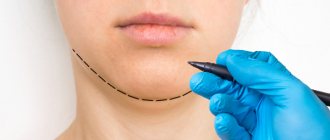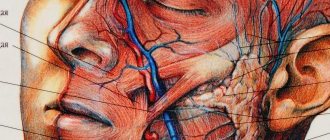Dissatisfaction with the chin is radically different from some ghostly complexes. It shapes the contours of the face, creates harmony in profile and front, or, on the contrary, disrupts it. We asked the experts what could be done.
The chin reflects a person’s character and largely determines the overall perception of the image.
The shape depends on the structure of the bones of the lower jaw and muscles: the chin, depressor of the lower lip, depressor of the angle of the mouth, as well as fat deposits. A heavy chin gives a woman’s face a rough appearance, while a too small chin gives an expression of despondency. “The chin plays an important role in the perception of appearance,” says Elena Chirikova. — A person’s face is perceived as beautiful if it has harmoniously developed and balanced features, one of which is a slightly protruding chin. A seemingly small flaw - a small or sloping chin - can spoil the overall picture, and turn a beautiful, pretty face into an unattractive one.”
Usually the shape of the chin is an inheritance from relatives, passed down from generation to generation, but there are exceptions. For example, micrognathia - underdevelopment of one of the jaws - may be a sign of a genetic disease. It is often combined with glossoptosis (underdevelopment and retraction of the tongue), cleft of the hard palate and other developmental anomalies.
In each case, aesthetic medicine offers optimal solutions that will bring obvious results and change a person’s life for the better.
What is the difference
The main surgical methods that plastic surgery offers to change the chin are mentoplasty (genioplasty) and mandibuloplasty. “Mentoplasty is a surgical intervention directly on the chin area with the aim of reducing or enlarging it,” explains Elena Chirikova. — To reduce the chin, the bone structure of the chin is corrected; for enlargement, individual implants are installed.”
“Mentoplasty allows you to harmonize the face and strengthen the frame of its lower parts,” says Elena Karpova, “which prevents further ptosis of the soft tissues of the face (sagging).”
“Mandibuloplasty is the surgical correction of congenital and acquired defects of the lower jaw,” continues Elena Chirikova.
— This operation pursues not only aesthetic goals (elimination of asymmetry, improvement of the contour of the chin, etc.), but also solves problems of a functional nature (correction of pathological bite, normalization of articulation, chewing, etc.). Depending on the nature of the defect, mandibuloplasty may include osteotomy with lengthening of the jaw segment (for asymmetry), resection of the jaw with bringing together the mental protuberances (for a massive chin) or expanding the distance between the mental tuberosities (for hypotrophy of the chin), etc. Often, mandibuloplasty is supplemented with chin replacement "
REHABILITATION AFTER CHIN PLASTY
After the operation, the patient remains in the clinic until the next morning. The chin area is fixed with a special “invisible” plaster (without using a bandage).
Rehabilitation after chin correction takes up to 14 days. At this time, it is necessary to carefully observe a gentle regimen, avoid intense physical activity, and avoid sudden head movements.
In the first days after surgery, patients may experience swelling of the chin and discomfort in the suture area. To reduce unwanted effects and speed up healing, the doctor prescribes special medications, and physical therapy may be prescribed.
How to do more
There are several ways to enlarge a small chin. “The simplest is the introduction of a dense filler,” says Elena Chirikova, “a very convenient way for the patient to understand how much the chin needs to be enlarged and how much its changes change the appearance. The only drawback of this method is its short duration and the need for correction. Another way is to enlarge the chin with a silicone implant.
From my point of view, the most worthy and quite simple to install. The implant can be selected by shape, size, volume - the most suitable for a particular patient - and, if necessary, changes can be made to it with ordinary scissors or a scalpel, cutting off all unnecessary, working like a sculptor.”
To achieve the desired chin shape once and for all, the best option is to contact a plastic surgeon and use the second method. This method of mentoplasty is more complex, but gives a lasting result. Today there are no problems with choosing a polymer implant. The range is so wide that you can choose an option that exactly matches all the anatomical features of a face of any shape. Only a specialist can decide on the choice of implant.
“To understand how your appearance will change, there are several options for “trying on” a new image,” says Elena Karpova. — It is possible to visualize a picture of a simulated changed appearance by enlarging the chin on a computer.
You can make a 3D model of your face using modern technology and experiment with the size of your chin. And another effective way to understand whether you like your look is to inject a filler based on hyaluronic acid. If you don’t like it, the filler will degrade and everything will return to its place.”
Blepharoplasty
Eyelid surgery is the most popular procedure among men. With age, the upper eyelids become heavier, the eyebrows droop, bags and bruises appear under the eyes, the face takes on the constantly tired and unhealthy appearance of a drinking person (even if the patient does not drink!).
In some patients, the skin of the eyelids droops so much that it even interferes with normal vision (then an ophthalmologist will refer you for plastic surgery)!
Fortunately, all these problems can be solved with the help of plastic surgery of the upper and lower eyelids - blepharoplasty.
To learn more
What are implants made of?
In addition to silicone implants, there are also bioprostheses (based on the patient’s cartilage tissue). Despite the fact that they are as safe as silicone, and therefore are also often used to enlarge the chin, experts note some nuances that can sometimes arise when using them.
“Of course, silicone implants are ideal for chin augmentation, because they do not affect the resorption of bone tissue,” notes Elena Chirikova.
— Silicone elastomer is a semi-soft material, and when changing such an implant, we see the absence of any resorption in the area of the bony part of the chin. If the implant is made of a hard material (for example, a rib), then the bone part of the chin experiences severe pressure from the bioimplant, which forces it to follow the contour of its posterior (facing the bone) part, and the bone part of the chin is resorbed, that is, it loses its own volume.”
BOTOX® and Dysport® injections
Wrinkles at the corners of the eyes (“crow’s feet”), deep wrinkles on the forehead and bridge of the nose, and other inevitable signs of age and stress can be permanently eliminated or “softened” with Botox or Dysport injections. This procedure is quite comfortable, since it is carried out under the influence of a special anesthetic cream and does not leave any traces. No rehabilitation required. After the injections, the patient can immediately return to work.
Botox or Dysport injections are also used to eliminate excessive sweating and unpleasant odor (treatment of hyperhidrosis). Just one procedure will relieve you of sweating for a whole year.
To learn more
How to do less
For those with a large chin, the choice of correction method is limited to two options. In cases of severe fat deposits and excess skin, simultaneous liposuction and lifting of the lower third of the face are performed in combination with tightening of the skin and subcutaneous muscle of the neck. Today, there are endoscopic techniques that leave virtually no traces. If the cause of massiveness is not excess muscle or fatty tissue, but bone (lower jaw), then an osteotomy operation with removal and/or relocation of bone tissue fragments is necessary.
“There are two surgical methods for reducing the chin: the bone tissue is either simply excised, or the bone fragment is shifted posteriorly,” says Elena Chirikova. — The result of the operation is corrected, if necessary, by introducing fillers or your own adipose tissue.
There are also cosmetic methods for reducing the chin - the introduction of lipolytics and other drugs, but they cannot serve as an adequate replacement for surgical intervention. Their capabilities are seriously limited, and the results last no more than a year. Only surgical chin surgery can solve the problem once and for all.”
IS CHIN PLASTY RIGHT FOR ME?
Indications for chin correction surgery may include:
- An underdeveloped, sloping chin, creating the effect of a small “bird” face;
- A small chin and age-related changes, as a result of which soft tissues slide down, forming “jowls” and a double chin;
- Too large, protruding chin;
- Wide, heavy lower jaw (“horse-like” face);
- Unattractive or asymmetrical chin shape.
To obtain a comprehensive result, chin surgery can be combined with liposuction and neck lift, as well as rhinoplasty.
Results Before and After CHIN PLASTY View now
How is the operation performed?
To correct a double chin with excess fat deposits, 30–40 minutes are enough; surgery to enlarge the chin using implants or lipofilling will require 1.5–2 hours; chin reduction surgery is the most complex type of operation and can last up to 2–2 hours. 5 o'clock. All surgical interventions are performed in a clinical setting under general anesthesia. To install the implant, the surgeon needs to make an incision. “There are two options for the location of the scar line: in the submental area or in the oral cavity,” says Elena Karpova. In the area between the gum and lip. Any of the prostheses is installed under the periosteum of the lower jaw, which reduces the likelihood of its displacement.
“Rehabilitation takes on average one to two weeks,” continues Elena Karpova. “In our practice, we often combine mentoplasty with facelifting, which allows us to obtain a more pronounced and lasting effect.”
Rhinoplasty is often performed simultaneously with plastic surgery, which allows you to get a completely harmonious appearance in one operation.
“In general, mentoplasty—chin reduction and enlargement—is a fairly simple, short-term operation with a short rehabilitation period,” says Elena Chirikova. “Mandibuloplasty is a more complex operation that requires a long recovery process.” During the first week after surgery, discomfort, swelling, and numbness of the tissue are noted. The final result can be assessed after one and a half to three months. However, many are afraid of more serious side effects that may occur after chin surgery, such as problems with speech and chewing.
“Mentoplasty, like any operation, is associated with certain risks,” states Elena Karpova. — After it, rejection or displacement of the implant, bleeding, and loss of sensitivity are possible, but we have not observed such complications as problems with speech and chewing in our practice. All of the listed cases of complications are extremely rare in the practice of an experienced surgeon.”
DO YOU NEED THE BEST CHIN PLASTIC SPECIALIST IN MOSCOW?
Plastic and maxillofacial surgeon Ekaterina Sergeevna Kudinova is a candidate of medical sciences, a leading Russian specialist in the field of plastic surgery of the chin, lower jaw and nose.
As a leading researcher at the best Moscow clinical center of otorhinolaryngology, Ekaterina Sergeevna performs complex facial reconstructive surgeries for patients injured in accidents. This unique experience helps her achieve excellent results in relatively simpler aesthetic chin surgery and complex profile correction surgeries.
Delicacy, tact and the ability to empathize allow the doctor to gain trust and find mutual understanding with each patient.
You can make an appointment for a consultation with Ekaterina Sergeevna Kudinova by calling 1 or. You can also leave a request through the online consultation form on the website.
Contraindications for surgery
- Heart and pulmonary failure;
- Infections and inflammatory processes;
- Diabetes;
- Oncological diseases;
- Bleeding disorders;
- Exacerbation of chronic diseases
Elena KARPOVA, (@elena76016) Doctor of Medical Sciences, Associate Professor of the Department of Skin Diseases and Cosmetology, Russian National Research Medical University named after. N. I. Pirogova, plastic surgeon at the Danishchuk Clinic, member of the OPREH, member of the American Academy of Facial, Plastic and Reconstructive Surgery
Elena CHIRIKOVA, (@doctor_chirikova) plastic surgeon, Ph.D., member of OPREH, ISAPS
Other non-surgical procedures
Using non-surgical rejuvenation procedures is one of the easiest and fastest ways to give your face a healthier, more rested appearance. Non-surgical rejuvenation technologies for men include laser methods, plasma lifting, thread technologies and injections of vitamin preparations for the skin. These methods can solve a wide range of cosmetic problems, such as fine wrinkles, unhealthy (too red, or, on the contrary, gray) complexion, uneven skin texture, scars and post-acne. All these procedures give a quick effect, are easily tolerated by the patient and do not require long-term rehabilitation.
When performing rejuvenation procedures for men, Dr. Kudinova takes into account the characteristic features of male skin and uses care designed specifically for men.
To learn more
Causes
This type of anomaly can be triggered by the following factors, some of which are external, and some are internal:
- unbalanced diet of a woman during pregnancy - in this situation, the defect is formed already at the stage of intrauterine development of the fetus;
- chromosomal mutations that cause deviations in the normal growth and development of the baby during pregnancy;
- genetic predisposition;
- Robin's syndrome is a congenital anomaly of the anatomical structure of the facial apparatus;
- too early loss of baby teeth or permanent organs in adulthood , as well as a fairly long change from a temporary bite to a permanent one;
- difficulty breathing through the nose , associated with the structure of the nasal septum or chronic diseases of the nasopharynx;
- mechanical organ injury.
Everything about correct orthognathic occlusion, its signs and characteristics.
Let's talk here about the treatment of dental dystopia.
Follow the link https://orto-info.ru/zubocheliustnye-anomalii/okklyuzii/glubokiy-prikus.html if you are interested in methods of treating deep bites in adults and children.
Prevention
In some cases, the development of such a defect can be completely avoided by following the following recommendations:
- preference should be given to breastfeeding , and if this is not possible, control the hole on the nipple - it should not be large in size;
- it is necessary to choose the right pacifier so that its position does not put constant pressure on the weak bone tissue of the gums;
- timely treatment of dental diseases.







